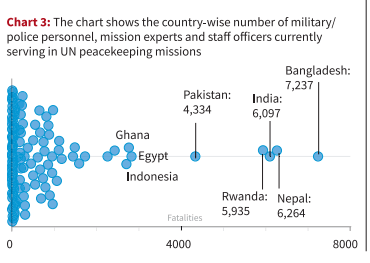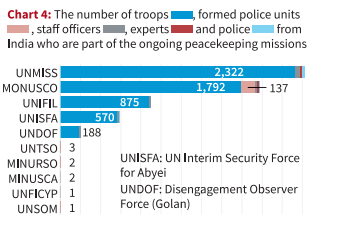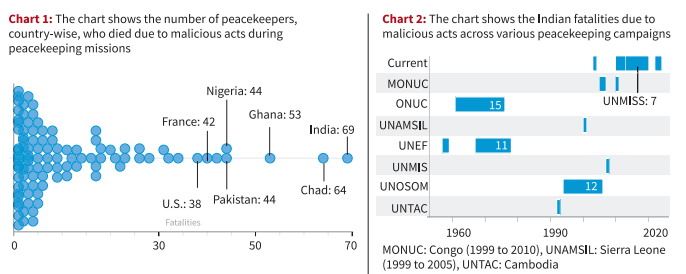
In News
The United Nations observed the 75th anniversary of its peacekeeping missions .
About UN peacekeeping
- Background : United Nations Peacekeeping began in 1948 when the Security Council authorized the deployment of military observers to the Middle East.
- The first military observers were sent by the UN Security Council to oversee the Israeli-Arab Armistice Agreement in May 1948.
- Overview : It is a unique global partnership. It brings together the General Assembly, the Security Council, the Secretariat, troop and police contributors and the host governments in a combined effort to maintain international peace and security.
- Its strength lies in the legitimacy of the UN Charter and in the wide range of contributing countries that participate and provide precious resources.
- Basic principles: Consent of the parties;
- Impartiality;
- Non-use of force except in self-defence and defence of the mandate.
- Strengths : Peacekeeping has unique strengths, including legitimacy, burden sharing, and an ability to deploy and sustain troops and police from around the globe, integrating them with civilian peacekeepers to advance multidimensional mandates.
- Roles : UN peacekeepers provide security and the political and peacebuilding support to help countries make the difficult, early transition from conflict to peace.
- Peacekeepers help prevent conflict, protect civilians, advance political solutions, promote human rights, and support democratic processes.
- They also help build the capacity of state institutions and services and ensure that women and youth can participate in and lead peace processes.
- There are currently 12 UN peacekeeping operations deployed on three continents.
- Progress :For 75 years, UN peacekeepers have saved and changed lives in the world’s most fragile political and security situations.
- Peacekeeping is flexible and over the past two decades has been deployed in many configurations.
- Today’s multidimensional peacekeeping operations are called upon not only to maintain peace and security, but also to facilitate the political process, protect civilians, assist in the disarmament, demobilization and reintegration of former combatants; support the organization of elections, protect and promote human rights and assist in restoring the rule of law.

- India’s role : Indian troops and experts have played a significant role in the UN’s peacekeeping missions.

Challenges
- UN peacekeeping faces increasingly difficult challenges, including attacks against our peacekeepers, complex mandates, and uneven political support. Peacekeeping is essentially a collective endeavour: a partnership.
- The Charts below show the number of peacekeepers, country-wise, who died due to malicious acts during peacekeeping missions.

Suggestions
- We require strong, collective action if we are to succeed in addressing the existing challenges.
- Strengthening peacekeeping means helping countries who provide us with troops and police, including by supporting training needs to ensure we deploy personnel equipped and prepared to accomplish these tasks.
- Ensuring that all United Nations personnel maintain the highest standards of conduct must be at the heart of our collective efforts.
- We must continue to work harder and closely with Member States who possess the authority to hold all categories of personnel accountable for criminal conduct.
|
Mains Practise Question [Q] United Nations peacekeeping missions have always been highly dynamic and have evolved in the face of new challenges.Comment. |
Previous article
A Way Out of the Coal Trap
Next article
BrahMos: 25 Years of the Joint Venture